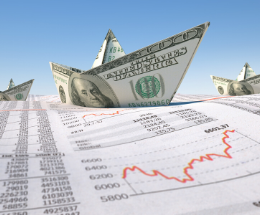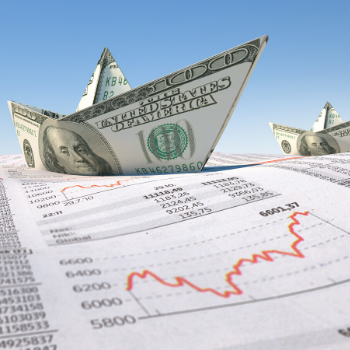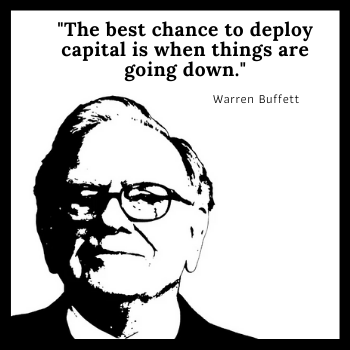
How Smart Investors See Opportunities in a Distressed Market

COVID-19 and the Distressed Market
Responding to the COVID-19 pandemic, state governments across the U.S. have placed shelter at home orders and have shut down non-essential businesses. People are staying at home and connecting online rather than face to face. The underlying uncertainty of the pandemic along with dwindled consumer spending, mass lay-offs and many other factors have quickly changed the course of a strong U.S. economy from back in January to a distressed market in March 2020. While this black swan event has many investors reacting to the market fluctuations, selling and turning assets into cash or buying gold, expert investors preach a different practice.
Words of Wisdom from Expert Investors
Warren Buffet, one of the most successful investors in the world, is not a fan of cash: “The one thing I will tell you is the worst investment you can have is cash. Everybody is talking about cash being king and all that sort of thing. Cash is going to become worthless over time. But good businesses are going to become worth more over time.” He shares similar thoughts on gold which he calls “unproductive asset”, hence the reason why Berkshire never puts any significant amount of capital into precious metals.
Foreign markets have not stayed immune to the global selloff spurred by the coronavirus pandemic, either. The drop in stock indexes (from their peak to their lowest point) has been the worst in energy-dependent Russia (-50.8%). Other stock markets across the continents have also wreaked havoc: Brazil (-57.8%), Indonesia (-48.0%), South Africa (-46.3%), Egypt (-37.9%), UAE (-36.6%). On top of the economic instability, some of these foreign countries also face political instability, which either makes investors nervous about investing in their own countries’ markets or nervous about keeping their wealth in savings accounts.
Robert G. Allen, one of the most influential investment advisors of all time, does not find savings accounts or keeping cash under the mattress particularly helpful. He is frequently quoted, “How many millionaires do you know who have become wealthy by investing in savings accounts? I rest my case.”
Carlos Slim, a Mexican business magnate and investor, is one to advocate for seizing the opportunity, “Anyone who is not investing now is missing a tremendous opportunity.”
Why Invest During an Economic Downturn?
The answer is straight forward. Because of a drop in price. Market crashes or market corrections should be viewed as buying opportunities and not as reasons to panic. Some of the most profitable or successful investments Warren Buffet has ever made were during market crashes.
What Are the Best Investment Options During a Financial Crisis?
1. Stock Market Investing
Those active in the stock market have learned this rule in Stock Investing 101- you buy when the price is down, and you sell when the price is up. This strategy is simple enough and those who carefully pick their options, typically are able to realize a nice return on investment. But selecting an opportune stock does require some research and knowledge of the trends or industry of the company stock you are buying. If you are about to venture into the stock market because you’ve heard you can make a quick profit, then you better be prepared to also handle the risk of a big loss. According to Warren Buffet, surrounding yourself with the right people, the ones who have the expertise, the right mindset and patience are key to realizing significant profits in the stock market.
2. Distressed Debt Investing
Distressed debt investing means purchasing corporate debt like bank loans, investment-grade bonds or high-yield bonds at a discount. Distressed debt may be an attractive investment for those who are interested in alternative investments. Considering the current pandemic there are many industries that are significantly distressed, including airlines, hospitality, restaurants, casinos, and many more. While distressed debt investing is typically conducted only by institutional investors, individual investors can also par-take if they have a significant risk tolerance. Because distressed debt strategies carry such a high risk, retail investors are advised to work with seasoned distressed debt investment managers who have experience in the world of restructurings, Chapter 11 bankruptcies, and negotiating with financial advisors, legal advisors and companies, in order to achieve outsized returns.
3. Real Estate Investing
According to an article in The Wall Street Journal, a growing number of property investors are preparing for what they believe could be a once-in-a-lifetime opportunity to buy commercial real estate assets at bargain prices.
One such investor is The LCP Group, L.P., a 45-year old real estate investment management firm. “While it is too early to tell what the full extent of the impact will be on commercial real estate values, we believe this may be a time to take advantage of market opportunities, as many properties will be steeply discounted from their values from last year, even last month”, said Richard Marquard, an Executive Vice President at The LCP Group, in an interview with Regnum.
This notion is shared by other real estate experts as well. While commenting on the coronavirus pandemic Forbes Real Estate Council member, Brian H. Robb, shares that the perfect time to acquire real estate is now. His prediction is that the current conditions could lead to a considerable drop in real estate values in the short term, at least in markets that are overly inflated (South Florida and Las Vegas, for example). Combined with low mortgage rates this creates the perfect environment for seizing real estate opportunities of high value at discounted price.
Moreover, in the past 50 years real estate returns have exceeded stock returns with significantly less volatility. As the matter of fact, since the early 1970s real estate has beat the stock market nearly 2:1. Individual investors who do not have enough expertise in the real estate market are advised to work with tenured real estate investment firms who can easily have access and source deals with distressed commercial real estate.
Making Smart Investments in a Distressed Market

It is critical to understand that during a time of market distress, when conditions may be anything but normal, individual investors can still find opportunities in new asset classes and build wealth. There are a couple of things to remember about seizing opportunities in a distressed market. 1. “The best chance to deploy capital is when things are going down”, according to Warren Buffet. 2. Do your due diligence on the investment asset you plan to engage in and if you lack the expertise, seek out a qualified and experienced investment manager. And like Warren Buffet has said before, “For 240 years it’s been a terrible mistake to bet against America, and now is no time to start.” Even at a time of market volatility, the United States continues to offer advantageous investment opportunities that can pay off big in the long term. Smart investors plant a tree today, so they can sit in the shade tomorrow.










